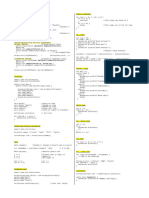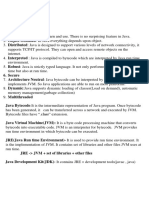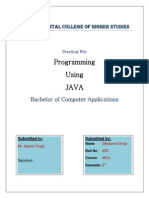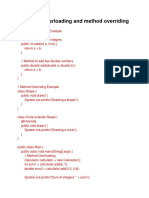0% found this document useful (0 votes)
17 views8 pagesJava New Features Unit 3 Program Used in Video (RRSIMT)
The document provides an overview of various new features in Java, including nested classes, anonymous classes, lambda expressions, functional interfaces, default and static methods, sealed classes, and Base64 encoding/decoding. It also covers the use of the switch expression, yield keyword, text blocks, and records. Each feature is demonstrated with code examples to illustrate their usage and functionality.
Uploaded by
mahesh2635583Copyright
© © All Rights Reserved
We take content rights seriously. If you suspect this is your content, claim it here.
Available Formats
Download as PDF, TXT or read online on Scribd
0% found this document useful (0 votes)
17 views8 pagesJava New Features Unit 3 Program Used in Video (RRSIMT)
The document provides an overview of various new features in Java, including nested classes, anonymous classes, lambda expressions, functional interfaces, default and static methods, sealed classes, and Base64 encoding/decoding. It also covers the use of the switch expression, yield keyword, text blocks, and records. Each feature is demonstrated with code examples to illustrate their usage and functionality.
Uploaded by
mahesh2635583Copyright
© © All Rights Reserved
We take content rights seriously. If you suspect this is your content, claim it here.
Available Formats
Download as PDF, TXT or read online on Scribd
/ 8
























































































